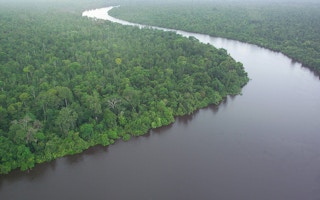Indonesia is under pressure to properly enforce sweeping land-management reforms to improve its record on devastating wildfires with less than a week to crucial climate talks in Paris.
“As a global disaster, this massive spike in Indonesia’s emissions will be a major challenge for global efforts to address climate change, especially in light of the Paris COP21 climate negotiations next week,” said Andhyta Utami, climate program manager of the World Resources Institute in Indonesia.
Singapore’s deputy prime minister Teo Chee Hean met with Joko “Jokowi” Widodo at Indonesia’s State Palace in Jakarta on Wednesday to discuss preventative measures to tackle future haze crises. Teo also met with Indonesian chief security minister Luhut Pandajaitan.
Luhut is understood to have told Singapore’s deputy prime minister that the city state would see tangible differences in subsequent years because of the policies put in place by the Indonesian government in recent weeks.
Jokowi has said he will ban all development on peat, restore at least 2 million hectares of land and block the drainage canals that make the marshes highly flammable.
“Burning forests and peatlands kills virtually everything living there and many plantations are landscape scale,” said Dr. Ian Singleton.
While the government’s new policies have yet to be made law, there are some signs local actors are increasing pressure on district and provincial governments to enforce Jokowi’s plans to restrict land used for plantations.
“We reject the presence of oil palm plantations along the Musi River basin, especially in Banyuasin,” said Ahmad Syaifudin Juhri, head of an indigenous people’s organization in South Sumara province. “Currently, indigenous peoples are demanding a moratorium on concessions being issued.”
Adio Syafri of Forest Kita Institute (IPR), an Indonesian NGO, supported the group’s call for conservation of the Musi basin.
“The Musi river should be maintained and, if need be, reorganized and restored,” said Adio.
The acting governor of South Sumatra, Alex Noerdin, has been under significant pressure to improve the province’s capacity to address its wildfires after it became the epicenter of the international firefighting operation in September and October.
“
The massive contribution we are making to global climate change are a huge source of embarrassment to the rest of us.
Dr Sunaryo, Research Center for Climate Change
“South Sumatra province is committed to green growth by addressing land and forest fires,” the governor said in a statement. “By moving forward through sustainable palm oil initiative, with the help of key stakeholders, farmers’ productivity and people’s lives can be improved while also helping to overcome the challenges of fire protection and legality of peat land.”
Rains over Kalimantan and Sumatra have calmed many fires but blazes continue to burn in the sparsely populated – but densely forested – eastern region of Papua, which continues to battle dry conditions. Data for the last 24 hours from Global Forest Watch show several “high-confidence” fires burning in Merauke regency in Papua province.
Other parts of the archipelago also continue to battle fires, such as East Kutai regency in East Kalimantan.
“Whilst some people, somewhere, are lining their pockets through unsustainable use of Indonesia’s forests, the resulting fires and haze that incinerate the land, and our wildlife in the process, and the massive contribution we are making to global climate change are a huge source of embarrassment to the rest of us,” said Dr. Sunaryo of the Research Center for Climate Change.
Scientists and researchers warn that increased scrutiny needs to be placed on local governments in order to see adequate implementation of the central’s government’s reform plans.
“Satellite data shows over 135,000 hotspot alerts in Indonesia over the last six months that have severely damaged at least 2 million hectares of land, of which, 600,000 were peatlands,” said WRI’s Andhyta.
“We need clear, decisive action now. We need the government to implement effective policies to reduce emissions, including a single countrywide ‘one map’ of land use and dramatically improved spatial planning at all levels, and to enforce the law.”










